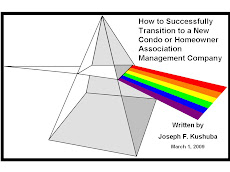
If and how you use a Management Company to help manage your association duties, will be an important area to examine for cost reduction opportunity. This category of expense can run upwards of 30% of an association’s annual budget -- money that you may be able to spend more wisely. Depending on the nature and severity of your financial situation, you may be forced to take on more of those duties even though it may not be your first choice. Elimination of some or all of the services, rebidding/renegotiation of the Management Company contract, innovative use of private contractors or specialty service providers, holding Management Companies more accountable for cost reduction, and/or “partnering” to jointly attack cost reduction, are all within the realm of possibilities.
The reasons for an association using a Management Company can range from “convenience” for some to a “necessity” for others. But, if an association’s BoD is facing a severe financial condition, it may have to take on more of these direct management duties than it would prefer. Since the use of a Management Company can represent a major expense to an association, it is an area of cost reduction opportunity that cannot be ignored.
There are several things that should be highlighted regarding the use a Management Company.
- While management companies can simplify things for a condo or homeowner association BoD, they do not replace the BoD. A Management Company reports to and receives its direction from the BoD and not the other way around. The BoD has hiring/firing authority and can eliminate, replace, revise, or renegotiate a contract with a Management Company.
- Inexperienced BoD’s must guard against a Management Company “dependency” where the Management Company is calling all the shots and the BoD is merely a rubber stamp. A good Management Company can be a real benefit to your company. They do bring experience, an extra set of hands, and usually ideas tried and proven in a condo or homeowner association environment.
- A BoD has a fiduciary responsibility to the association for which it serves. This fiduciary relationship requires the members of the BoD to act in good faith and in the best interests of the members of the association and that they exercise due care and diligence. A fiduciary obligation represents the highest level of responsibility under the law. Unlike a Contractor, a Management Company acts as an agent of the association and is also held to the same fiduciary responsibility as the BoD. Likewise, it has a duty to manage association’s costs in the most effective way possible.
- A Management Company, like any company, is only as good as its people. They may not have the necessary skill sets to attack cost reductions and may have “blind spots” that prevent them from examining new ways to attack cost creep that will eventually come into play. Like the BoD, they too can also fall into the complacency trap of simply meeting cost increases by raising association fees. Today's Management Company must do more than review monthly budget reports, handle violation notices, or perform the daily maintenance activities. They must minimize costs at every opportunity and come up with creative ways for condo and homeowner associations to combat rising costs or economic downturns.
- The relationship between an association BoD and its Management Company is usually a deep one, and one that can last for a long time. The longer a working relationship lasts, the better the two parties understand one another and work together. But, it also may be more difficult for an association BoD to change suppliers or to address a lackadaisical cost reduction performance. A responsible BoD must take any action that is necessary and to set the expectation with its Management Company that cost reduction is one of its primary responsibilities. It is also their job to replace them if they are unable to deliver.
- If an association BoD chooses to use a particular Management Company, it should expect a relentless effort to help them reduce their costs. This is a new concept for many, as they are much more comfortable with just delivering the services outlined in the contract. Take a look at your existing contract or a proposal from a potential Management Company. Do you see a statement that says they will deliver cost savings to the association? Or better yet, do you see a statement that says they will deliver (X) % of cost savings to the association? A Management Company like any other supplier does not like to be pinned down. It often easier to just deliver the service and pass alone any cost increases to association members in the form of increased fees or special assessments. Management Companies should be held accountable for cost performance and a provision should be incorporated into their contract to reinforce that responsibility.
Shown below are some ways to cut your Management Company cost:
- Determine the level of self-management that you will use and that you can afford (Take apart the Management Company contract line-item-by-line item and explore alternative ways to eliminate, revise it, or have the service performed by someone else at a lower cost. Separate the association “needs” from its “wants”. Have the Management Company provide quotes for each line item in the contract. This will allow for an apples-to-apples comparison with self management or other suppliers. Use this eliminated or reduced service level as a basis to renegotiate a lower priced contract.
- Use consultants, freelances or part-time employees, instead of full-time employees.
- Often, one of the largest expenses is bookkeeping. If you have an active volunteer group that is willing to take over some management tasks, you can realize significant savings by hiring an accountant to handle the books and to process payments/receipts.
- Competitively source your small service projects. For small service needs, it is not necessary to have a Management Company or professional contractor perform small maintenance tasks or to fix every little problem. (Handyman Services. For condo or homeowner associations that can't afford a full time maintenance person, contract with a licensed, bonded and insured handyman who can perform a monthly "laundry list" of small repairs. Combine tasks to provide a full day's work. Moonlighters. In most buildings, the building staff moonlights as painters and general repair persons. Talk to your staff and see if they would like to make extra money by doing some of the work that normally a professional would do. The best example of this approach is touch-up painting in halls and stairwells. Develop a closer alliance with subcontractors to perform work in the neighborhood to get small projects done quickly and cost effectively. Volunteers. You may have members who have special skills/hobbies (engineers, contractors, woodworkers, gardeners, skilled trades, etc.) who may be willing to perform small maintenance duties or projects. Do no be afraid to ask for their help. The use of volunteers is an excellent way to help keep your costs down.)
- Jointly explore with the Management Company any changes that the association cold make to reduce the Management Company cost that in turn could be passed along to the association. (Eliminate or reduce the amount of time that a Management Company is required at BoD meetings. Shorten the length of BoD meetings. Hold quarterly meetings versus monthly meetings. Hold daytime meetings during normal business hours to avoid overtime. Move the Board meeting to the management office to save manager time and avoid mileage charges. With an approved budget, proper policies in place and a management planning calendar, the Management Company should be able to handle most issues with only occasional input from the president.)
- Reconfigure how a Management Company handles administration of insurance claims and damage reconstruction. Insurance matters can take many hours of a Management Company’s time. If the contract agreement specifically states that insurance claim work is an extra cost to the association, the Management Company can bill the insurance claim for the time it takes to administrate a claim and renovation work. A similar principle involves time spent on collections or legal action against an owner. This management time should be billed to the delinquent owner.
- Rather than having the association bear the cost for preparing sale disclosure statements to owners who are selling their homes and buyers' lenders, have the Management Company bill owners and buyers separately for this service.
- Scale back on the frequency of services that are offered.
- Limited office hours or lengthened response time
- Offer part-time services for security, gate/door attendance
- Send out association dues on a quarterly basis versus a monthly basis. Allow members to pay dues on a semi-annual or annual basis, if desired.
- Hold minor repair items until enough are accumulated to allow for a more efficient utilization of maintenance contractor’s time
- Conduct less frequent inspections for CC&R violations and batch process related notices.
- Use electronic communications to members and record keeping to eliminate paper, filing, stamps, mail handling, etc. Allow for electronic payment of association fees.
- Eliminate all overtime and transportation expenses for Management Company employees
- Include in the Management Company contract a specific reference to the expected level of cost savings efforts required of the Management Company. This could be in the form of a specific amount or a percentage of operating costs. Then, conduct a performance review with the Management Company on the progress being/not being made. It is not uncommon for companies to demand a 10-15% annual cost savings from their internal departments or outside suppliers.
- Go out and get competitive bids and bring them back to your current Management Company so they have the opportunity to lower their price for you. Large service contracts like a Management Company should be competitively bid every year or two. Even if you are totally satisfied with the service received and have no intention of changing providers, it will demonstrate to the membership that the BoD is practicing due diligence and good stewardship. Also, if a particular Management Company is maneuvering for a contract increase, a competitive proposal will work to the association’s advantage in negotiating or verifying that the current Management Company is entirely justified in the increase. If it is to the advantage of the association, negotiate a long-term contract with the Management Company that states in exchange for a competitive price, the association will not seek competing competitive bids for a certain period of time.
- Confront your Management Company if it announces a price increase and re-bid the order where appropriate.
- Request that your Management Company prepare recommendations on ways for the association to reduce association waste, increase efficiency, or save money.
- Develop a scorecard for keeping track of Management Company service, quality, delivery and pricing. Implement a monitoring program (metrics, customer complaint system) to better understand the service / issues.








